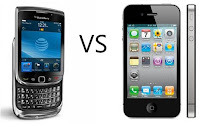 Short answer; Android because it grew up in the cloud and the whole world can look under it's hood and make changes if they so desire. A businessperson might like a blackberry because the brand has long been "synchronious" with MS Office and Outlook. A student, artist, musician or person who does not use a lot of Microsoft applications and appreciates the finer things in life may tend towards the iPhone. Particularly iPad/Mac users.
Short answer; Android because it grew up in the cloud and the whole world can look under it's hood and make changes if they so desire. A businessperson might like a blackberry because the brand has long been "synchronious" with MS Office and Outlook. A student, artist, musician or person who does not use a lot of Microsoft applications and appreciates the finer things in life may tend towards the iPhone. Particularly iPad/Mac users.People who are more "wired" may tend to live in the cloud, they may even have a technical profession. Designer, programmer, system administrator, network administrator, she may have an Android. Especially Linux users.
Even an older low end Android is a solid buy. Today, right now. Yes a sputtering slow that's so last year Android phone. An unlocked latest generation Android handset is with WiFi and 3/4G mobile hotspot is a trophy acquisition in terms of portability and versatility.
Let's review and assume that your low end Android has a service plan in your area. Internet access is slow with the 3G used by low end offerings but Wifi lets you use local networks.
WiFi means that if you never activate the phone in many countries you can still email, create and manage documents, make phone calls, get voice mail and send text messages, watch videos, television programs and movies, listen to radio stations all over the world anytime you can get on a Wifi network. Like say at McDonald's.
You have a phone you could use, and it's on your handheld wireless computer. Some with physical qwerty keyboards.
Also, unlike some devices your low end 'droid likely has a removable battery. That means you could carry spares for more cycles. Or use any number of micro USB portable charging devices. Even solar chargers for the outward bound.
Because Android basically is an interface for the underlying Linux OS, your Android phone is very compatible with a Linux computer, laptop, netbook, Kindle, etc.
Being open source and running on Linux basically means that Android is written for the internet, on the internet, and by the internet.
With Bluetooth and WiFi Androids can network locally with each other, smart devices, and computers without internet access. A personal android media player outputting to a large screen TV can be remote controlled by an Android handset on the same Wifi LAN. One Android can control the camera on another.
Because it's open source manufacturers can easily write apps like bluetooth keyboard drivers to make data/text entry comparable to desktop speeds.
Even with impressive LAN capabilities Android devices are still in their infancy of interconnecting to other devices locally.
In Airplane mode with no connectivity one can still create documents, write and test code, create and read email offline, watch video and listen to audio content. Kindle and Nook readers will display books stored on board or an expansion card.
With no access to anything the low end Android still stomps desktop workstations of a decade ago. For less than a single programmable calculator cost thirty years ago.
With a USB cable an Android that is otherwise dysfunctional could still be a handy mass storage device. For clever types, a USB connected Android could be used to log in securely and control a workstation whose keyboard is locked up. With USB access only, no internet, no WiFi, your Android is still a personal media player/eBook reader/calculator/PDA on steroids.
Apple and Blackberry are well known for solid hardware and polished applications. Android users can choose the brands and applications that makes sense for them. Many manufacturers and programmers compete for the users loyalty. Competition makes it better for everyone.
With Android and cloud computing no consumer can be locked into any manufacturer or software vendor. Ever. Techie types (some) have understood this for decades.
What that means for end users is that you get stuff that works and no hardware or software company can "rope you in".
Everything is going to the cloud, where Android was born and is being carefully raised.


0 comments:
Post a Comment
Important - If you are asking a question click the 'Subscribe By Mail' link below the comment form to be notified of replies.
Note:If you add a link to your comment it will not be published.